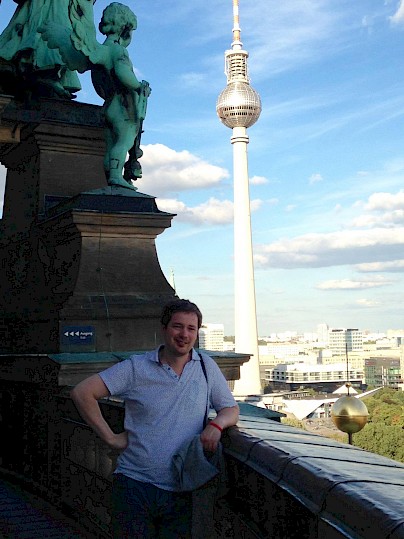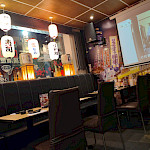3 Feb 2024
JETAA News

20th February 2021
JET Spotlight: Chris Leyland
Please, tell us about your career.
I am a Lecturer of Applied Linguistics At Newcastle University. So, I do a lot of teaching, research and supervision.
Teaching:
I lead modules on learning and teaching second languages on an Applied Linguistics and TESOL MA programme, and one module on teaching at universities. I also run a structured PhD programme in Educational and Applied Linguistics.
Research:
I am a researcher of social interaction. This means I collect videos of naturally occurring interactions and investigate the ways people communicate and achieve things. Basically, I place cameras in rooms and spy on people (with their consent, of course!). Most of my research to date has been on multilingual, intercultural communication – such as staffroom interactions between JETs and Japanese teachers and writing tutorials for international students at a British university. I am also researching interactions involving people living with dementia during creative interventions.
I really enjoy writing papers (here are a few that I've done) and travelling the world to give talks. So far, I’ve given talks in Japan, Sweden, Denmark, Finland, Italy, Switzerland, and more!
Supervision:
I have supervised over 100 Masters’ degree students on MA Cross-Cultural Communication and MA Applied Linguistics and TESOL (this includes a few ex-JETs actually). I currently supervise 7 PhDs. I am a busy bee!
How did you end up on the JET programme and where did you go?
Two lecturers during my undergraduate degree were ALTs when the JET Programme first started. They encouraged me to apply for JET and gave me loads of tips for the interview! Part of my undergraduate degree was on Linguistics, so language learning and teaching appealed to me. I was in Kagoshima from 2005-2009.
What are some of your best JET memories?
I mainly worked at an ‘academic’ high school in Kagoshima city and it seemed that students were constantly preparing for – and doing - exams. So during oral communication classes with me – where there were no exams – I really enjoyed giving them the chance to have fun in English. I really wanted to be a kind of big brother from another country – rather than an English teacher per se. So I really enjoyed showing them videos of Mr Bean (who I claimed as a local celebrity from my hometown) to help them de-stress after an exam!

What was your biggest challenge whilst on JET and how did you overcome it?
At this academic school I didn’t have many classes – despite my pleas! This led to me feeling quite lonely and frustrated. In some ways I had to accept this situation – but decided to fill my working days by writing an English newspaper and studying Japanese. I used to write a Japanese diary (クリスの日記) and have staff, students, and visitors (the ‘yakult lady’ and numerous textbook salesmen) check my diary and talk me through my mistakes. This helped me to fill my days, improve my Japanese, and make new friends!
Do you recommend doing further study after JET or going straight into the job market?
If you’d like to teach English at a college or university, then a Masters’ degree in Applied Linguistics, TESOL, Cross-/Intercultural communication is really helpful. We get loads of people who have taught in Asia (on JET, EPIK in Korea, or other programmes) and then do an MA with us in Newcastle. They usually go straight into college or university teaching jobs in Asia or elsewhere. Many of our graduates also teach on English for Academic Purposes (EAP) courses in the UK too. EAP is a really growing area actually. With so many international students at British universities, most have associated language/academic skills programmes.
How did your career progress after finishing JET?
Surprisingly smoothly! As the worldwide economic crisis was just starting when I finished JET, I decided to return to university and gain more qualifications. I did a Masters’ degree in Cross-Cultural Communication and International Relations. After graduating, I had several options: teaching English at colleges or universities in Asia, EAP teaching in the UK, and PhD study. I took this last option, and it took just over three years.
During my PhD I did a lot of teaching at Newcastle University. JET really helped me to feel confident speaking to large numbers of people, so I felt fine teaching in the UK.
After my PhD, I returned to Japan and did a research project at Kobe University, funded by the Japan Society for the Promotion of Science. I researched the ways JETs and Japanese elementary school teachers worked together, with a particular focus on multilingual skills and body language.
I then returned to the UK and became a permanent lecturer of Applied Linguistics at Newcastle University.
Are there any specific topics of research that your JET experience inspired?
I spent so much time hanging around Japanese school staffrooms – while everyone else around me seemed so frantically busy. I became fascinated by this environment. When thinking of a topic for my PhD, cross-cultural communication in Japanese staffrooms was the obvious choice for me.
So I used my JET contacts and recorded real-life interactions between JETs and Japanese teachers in two high schools. I focused on informal language teaching between teachers in this setting.
Also, a lot of JETs work with teachers who speak little English, particularly in elementary schools. I have always been curious about the ways they communicate – so I have done various studies looking at this too.

Any advice for JETs who feel that they want to get into the world of Academia? How might being a JET be an advantage?
Just go for it! JET has provided you with so many experiences that you can draw upon for years. You are now experienced in second language teaching and learning, cross-cultural communication, and cultural adaptation. Additionally JET can help you with public speaking. It is a real skill to be able to speak clearly and confidently to large groups of people. You will rely on this when teaching and giving talks.
JET inspires people in so many different ways. Academia gives you the change to really pursue even the most obscure interests for your whole career. It’s great!
How do you think JETs can get involved with Japanese cultural relations even after returning to the UK?
Local and national JET Alumni Associations are a great way of keeping in contact with ex-JETs and Japanese people living locally. Also, taking Japanese classes will help you to keep up your language skills but also may provide links to the local Japanese community.









